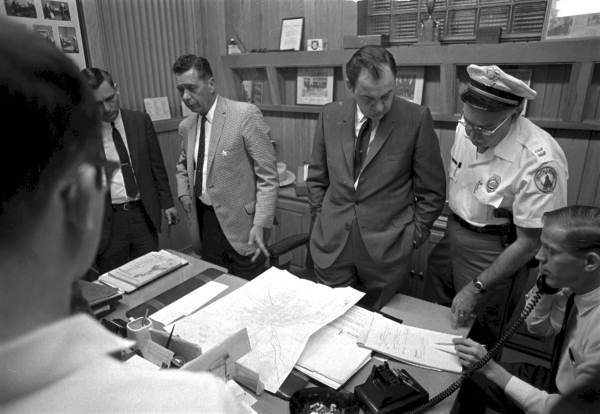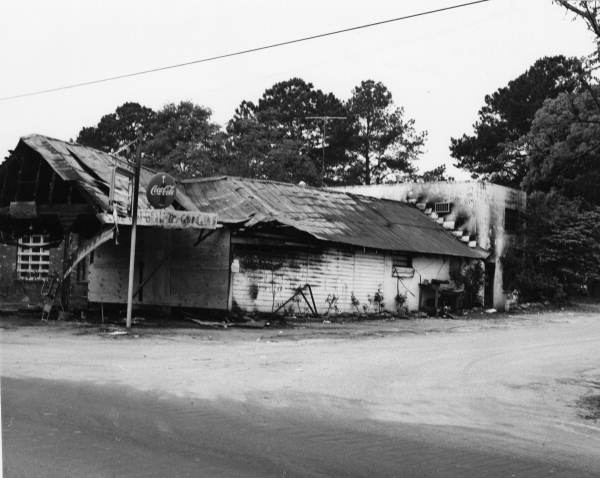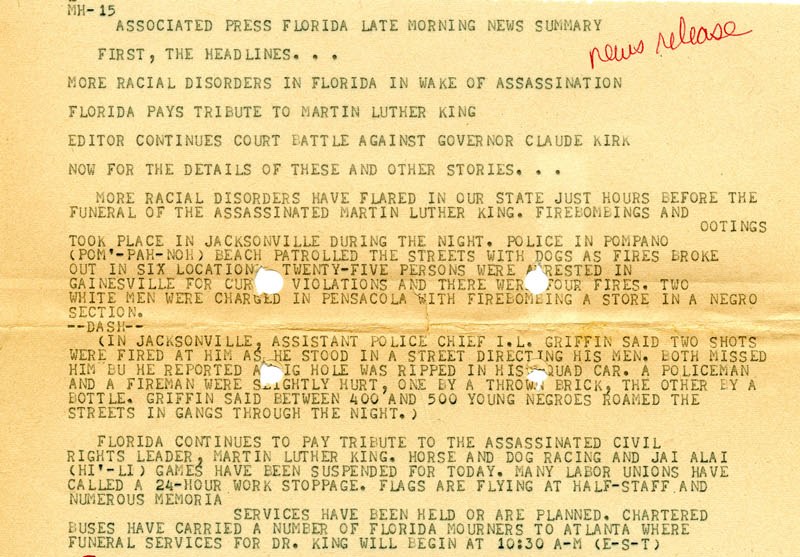Description of previous item
Description of next item
Florida Reacts to the Assassination of Dr. Martin Luther King, Jr. (April 4, 1968)
Published April 4, 2014 by Florida Memory
Civil Rights leader Dr. Martin Luther King, Jr. was assassinated by gunshot on April 4, 1968 as he stood on the balcony of a motel in Memphis, Tennessee. The reaction across the United States was a mixture of disbelief, grief, and at times violent anger. Tensions boiled over in scores of U.S. cities such as Baltimore, Chicago, Kansas City, and Washington, D.C. as young people took to the streets to vent their frustration at the untimely death of one of the era’s greatest forces for peaceful change.
Reactions to King’s death were just as passionate in Florida, where memorials, demonstrations, and rioting took place in several cities across the state. Police in Pensacola, Tallahassee, Gainesville, Fort Pierce, Pompano Beach, Tampa, and Jacksonville reported widespread rioting and the use of Molotov cocktails to firebomb businesses and residences owned by whites. At least one fatality resulted from these activities in Tallahassee, where one man aged 19 died when a firebomb was thrown into his family’s grocery store.
Local and state officials moved quickly to restore order. The city of Gainesville instituted a curfew shortly after news of the assassination broke out, requiring everyone except emergency personnel to remain off the streets between 11pm and 6am. In Gainesville and Tallahassee, law enforcement temporarily closed liquor stores, bars, and gas stations. Governor Claude Kirk met with state law enforcement officials to plan a statewide strategy for maintaining the peace, and kept in close contact with local sheriffs and police.
Organizations both inside and outside of the government encouraged the public to remain calm and avoid any further violence. Governor Kirk asked that all flags flown on public buildings in the state be flown at half mast for two days, and in a press release he called on Dr. King’s followers and admirers to live by King’s example and seek nonviolent solutions for their grievances. George Gore, president of Florida A&M University in Tallahassee, closed the campus for a weeklong “cooling off” period following the assassination. The Florida Conference of the National Association for the Advancement of Colored People (NAACP) released a statement calling for Floridians to observe the day of King’s funeral (April 9th) as a “time of sober reflection” rather than demonstration.
Although anguish and disillusionment over the death of one of the Civil Rights Movement’s foremost leaders would remain potent long after these events, the most dramatic reactions ended by the middle of April 1968. Rumors circulated that Governor Kirk would call a special session of the Legislature to discuss the crisis, but this proved unnecessary. The brief period of unrest in Florida that followed Dr. King’s untimely death has been captured in a number of documents and photographs, some of which are shown below.

Governor Claude Kirk meets with state law enforcement officials to discuss a response to the unrest following Dr. Martin Luther King’s assassination.

This photo from the Tallahassee Fire Department Collection depicts one of the casualties of the reaction that followed Dr. King’s assassination. Crow’s Grocery Store, located at 1902 Lake Bradford Road in Tallahassee, Florida, was damaged when a Molotov cocktail firebomb was thrown inside. Travis Crow, age 19, died of suffocation before he could escape the building.

This Associated Press news summary describes some of the typical stories emerging from the aftermath of Dr. King’s assassination.
The Florida Photographic Collection contains more images depicting Dr. Martin Luther King, his activities in Florida over the years, and the efforts of Floridians across the state to honor his memory.
Teachers and students may also find the Black History Month resources of our Online Classroom helpful, as well as our learning unit entitled The Civil Rights Movement in Florida.
Cite This Article
Chicago Manual of Style
(17th Edition)Florida Memory. "Florida Reacts to the Assassination of Dr. Martin Luther King, Jr. (April 4, 1968)." Floridiana, 2014. https://www.floridamemory.com/items/show/295159.
MLA
(9th Edition)Florida Memory. "Florida Reacts to the Assassination of Dr. Martin Luther King, Jr. (April 4, 1968)." Floridiana, 2014, https://www.floridamemory.com/items/show/295159. Accessed February 13, 2026.
APA
(7th Edition)Florida Memory. (2014, April 4). Florida Reacts to the Assassination of Dr. Martin Luther King, Jr. (April 4, 1968). Floridiana. Retrieved from https://www.floridamemory.com/items/show/295159

 Listen: The Folk Program
Listen: The Folk Program